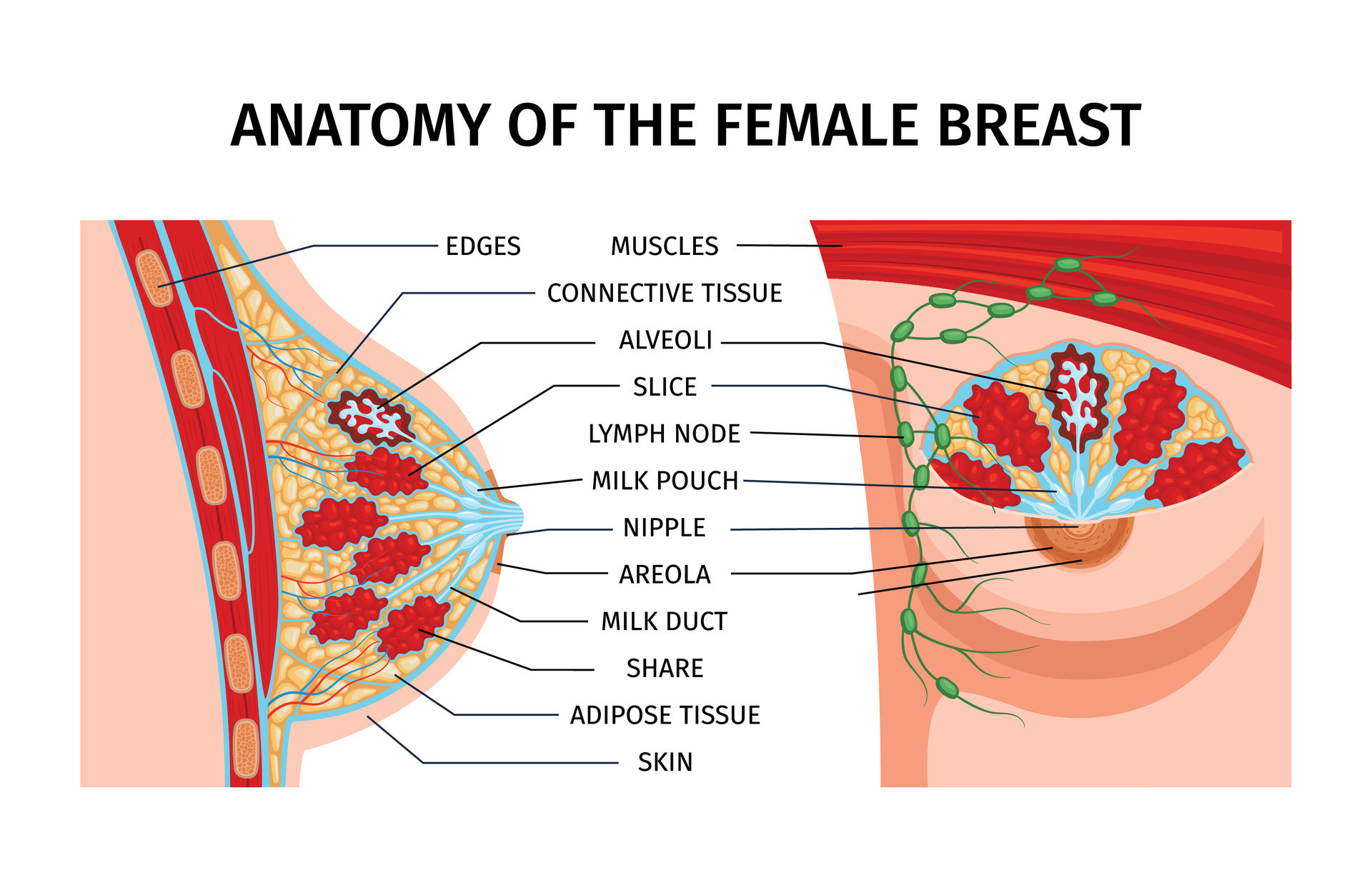Introduction
When it comes to health, our diet plays a vital role in shaping our well-being. This is especially true for breast health, which is influenced by our nutritional choices, lifestyle habits, and overall physical health. From preventing diseases like breast cancer to supporting hormonal balance, a diet tailored to breast health can make a difference. So, how exactly does what we eat impact our breast health? Let’s dive in to explore the nutrients, foods, and habits that contribute to a healthy lifestyle.
Understanding Breast Health
Anatomy and Function of the Breasts

The breasts are complex structures made up of glands, ducts, fat, and connective tissue. Their primary function is to produce and deliver milk, but they are also influenced by hormonal changes throughout a woman’s life. From puberty to menopause, breast health depends on multiple factors, including genetics, hormones, and lifestyle choices.
Common Breast Health Concerns
Breast health issues can vary from benign conditions like fibrocystic changes, which cause lumps or tenderness, to more serious conditions like breast cancer. Understanding these concerns can help us see why diet is so essential.
- Breast Cancer: One of the most common cancers among women, lifestyle factors, including diet, are closely linked to the risk of developing breast cancer.
- Fibrocystic Breast Changes: These are generally non-cancerous changes that lead to lumps or pain, often influenced by hormone levels.
- Infections and Other Conditions: Infections and benign tumors also affect breast health, though lifestyle can play a role in prevention.
The Role of Diet in Breast Health
What we eat influences the cells in our bodies, including those in breast tissue. Nutrients affect hormone levels, inflammation, and cellular repair, all of which are important for maintaining healthy breasts. By focusing on nutrient-rich foods, we support these natural processes and reduce the risk of many common breast health issues.
Essential Nutrients for Breast Health
Certain nutrients are particularly beneficial for breast health, aiding in everything from cell repair to hormone balance.
Vitamin D
Vitamin D has been found to play a crucial role in regulating cell growth and supporting immune function. Research suggests that adequate Vitamin D levels may lower the risk of breast cancer.
- Sources of Vitamin D: Sunlight is the best source, but foods like fatty fish, fortified milk, and egg yolks can also help maintain healthy levels.
Omega-3 Fatty Acids
Omega-3 fatty acids, found in foods like salmon, chia seeds, and walnuts, have anti-inflammatory properties that benefit breast tissue.
- Benefits for Breast Tissue: Omega-3s support cell health and have been linked to a lower risk of breast cancer.
Fiber
Fiber is essential for maintaining hormonal balance, as it helps the body eliminate excess estrogen, which can play a role in breast cancer development.
- Best Fiber-Rich Foods: Fruits, vegetables, whole grains, and legumes are excellent sources of fiber.
Antioxidants and Phytochemicals
These compounds protect cells from damage by neutralizing harmful free radicals. Foods rich in antioxidants, such as berries, leafy greens, and nuts, are great for breast health.
- Foods High in Antioxidants: Berries, dark chocolate, and green tea are excellent choices for their antioxidant content.
Foods That Promote Breast Health
Incorporating these foods into your daily diet can support breast health over time.
- Cruciferous Vegetables: Broccoli, cauliflower, and Brussels sprouts contain compounds that may help reduce cancer risk.
- Berries: Known for their high antioxidant content, berries like strawberries, blueberries, and blackberries protect against cell damage.
- Nuts and Seeds: Packed with healthy fats, nuts and seeds support hormonal balance.
- Fatty Fish: Rich in Omega-3 fatty acids, fish like salmon and sardines reduce inflammation.
- Whole Grains: Oats, quinoa, and brown rice are fiber-rich and help balance hormone levels.
Foods to Limit or Avoid for Better Breast Health
Certain foods can negatively impact breast health by contributing to inflammation or hormonal imbalances.
- High-Fat Processed Meats: Foods like sausages, bacon, and processed meats are high in unhealthy fats and preservatives.
- Sugary Foods and Beverages: High sugar intake is linked to increased inflammation and weight gain, which may raise cancer risk.
- Excess Alcohol: Drinking alcohol in large amounts is associated with an increased risk of breast cancer.
- High Salt Intake: Excessive salt can lead to fluid retention and discomfort, especially for those with fibrocystic breast changes.
The Impact of Weight on Breast Health
Maintaining a healthy weight is crucial for breast health, as excess body fat can lead to higher estrogen levels, increasing cancer risk. Adopting a balanced diet and staying active helps support a healthy weight and breast health.
The Role of Exercise in Breast Health
Exercise reduces inflammation, promotes hormone balance, and supports overall health. Aim for a mix of aerobic activities and strength training for optimal benefits.
Hormonal Balance and Breast Health
Hormones have a significant impact on breast health. Estrogen and progesterone, in particular, play a role in cell growth and repair in breast tissue. Certain foods, like soy and flaxseeds, contain plant-based estrogens that can support hormonal balance when consumed in moderation.
How to Adopt a Breast-Friendly Diet
To start a diet focused on breast health, include a variety of nutrient-rich foods, stay hydrated, and focus on portion control. Preparing meals at home can also help reduce the intake of unhealthy fats and sugars.
Myths and Facts About Diet and Breast Health
There’s a lot of misinformation about diet and breast health. For example, soy has been wrongly labeled as harmful due to its plant-based estrogen. However, moderate soy consumption is generally considered safe and may even be beneficial.
Lifestyle Choices Beyond Diet That Influence Breast Health
Diet is just one part of a healthy lifestyle. Avoiding smoking and limiting alcohol, along with regular screenings, are key.
Benefits of Early Detection and Preventive Healthcare
Regular mammograms and self-exams can help catch potential issues early when they’re most treatable. Make it a habit to monitor your breast health routinely.
Expert Tips and Advice for Breast Health
Healthcare professionals recommend eating a diet rich in fruits, vegetables, and lean proteins while limiting processed foods and maintaining a balanced lifestyle.
Conclusion
A diet rich in essential nutrients, combined with regular exercise and healthy lifestyle choices, can support breast health. By focusing on nutrient-dense foods, you’re not only fueling your body but also promoting optimal breast health. Remember, it’s the small, consistent choices that make a difference in the long run.
FAQs
What foods are best for preventing breast cancer? Foods high in antioxidants, such as berries, leafy greens, and nuts, along with fiber-rich foods, support overall breast health and may help reduce cancer risk.
Can a high-fat diet increase breast cancer risk? Yes, high-fat diets, especially those containing processed or unhealthy fats, can increase the risk of breast cancer by promoting inflammation and weight gain.
How often should I get screened for breast health? It’s recommended to have yearly screenings starting at age 40, or earlier if you have a higher risk. Speak with your healthcare provider to develop a personalized screening schedule.
Are there specific foods that can help with hormone balance? Yes, foods like flaxseeds, leafy greens, and cruciferous vegetables can support hormonal balance and benefit breast health.
What is the best way to incorporate more fiber for breast health? Including fruits, vegetables, whole grains, and legumes in every meal will help boost your fiber intake naturally, supporting both digestive health and hormone balance.






